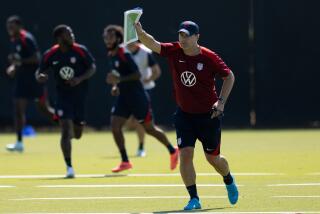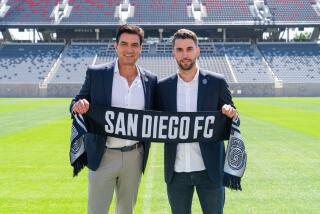A Brazilian Legend Toils in Obscurity : Soccer: Fans in his native country are on a first-name basis with World Cup hero Rildo Menezes, now coach of the Salsa.
FULLERTON — He is Rildo, a one-word household name in Brazil. He is here because one day in 1976, his telephone rang, and Pele was on the other end.
“Pele was playing for the New York Cosmos, and he called and asked if I was interested in coming to the United States,” said Rildo Menezes, Salsa coach. “I say, ‘Of course.’ ”
So off he went, joining the North American Soccer League’s Cosmos in 1977. And other than vacations, he has never returned to Brazil--where he still is treated like royalty.
In movie theaters, on the streets, people there recognize Rildo and stop him and want to know more about 1970, when he helped his country to its last World Cup championship, or about that 1966 World Cup match in which he scored a goal.
“I go into a restaurant and say ‘How much?’ and the guy says, ‘No, we’ve got it for you,’ ” Rildo said.
By placing his life in his feet, he turned himself into something the United States has yet to produce: a true soccer hero.
“It’s not easy,” Menezes said this week while sitting in his Salsa office. “You have to play many games. You have to play on the national team or forget it. It’s not easy.
“You have to be not only good, but lucky. In Brazil, there are thousands of players. In Rio de Janeiro--there are four teams there. In Sao Paulo--there are another six.
“To make the 11-member National team, this is a dream. And I got my dream come true.”
In the United States, kids want to grow up to be Magic Johnsons and Michael Jordans. In Brazil, it was Pele, Rildo and others on the Brazilian National Team.
On this July day, Rildo is dressed comfortably in dark blue jeans and a light blue Oxford shirt, with a gold chain around his neck and a beeper attached to his belt. He is trim and looks at least a decade younger than his age, which is 51.
He has a comfortable life here, but the days when he and Pele tore it up on the World Cup soccer fields together are long gone. To make it in soccer in the United States, you have to be creative.
“To live with soccer here, you have to do camps and coach semi-pro teams,” Menezes said.
You also have to look outside of soccer, no matter how big of a name you are in another country. Menezes is the co-owner of a restaurant in Yorba Linda and the owner of four apartment buildings in Brazil.
“When I play soccer in Brazil, I bought apartments for my future,” Rildo said.
Now, he is the coach of an expansion franchise in the American Professional Soccer League. While Pele, perhaps the only soccer player to become famous in the United States, makes another MasterCard commercial, Menezes will coach the Salsa in a league match in front of maybe 5,000 on a good night.
“It’s frustrating,” Rildo said. “I want to stay here and give my best for the players growing up here. The U.S. needs more coaches and better referees. Soccer here is growing up. The American players are good players; they can play all over the world. But the kids now know soccer more than the coach.”
And forget the big crowds and the pageantry of matches in Brazil.
“Some Sunday you go to the stadium, there are a lot of big flags, it’s like you’re going to a party,” Rildo said. “That’s the atmosphere I want for here in the future. Have players excited, have them come and look for the flag of their club, have more enthusiasm.
“In Brazil, there are 11 players. The 12th player is the fans who give support. I miss that. After the World Cup, I think it will come here. After the World Cup, people will say, ‘Wow, this is real soccer.’ ”
For now, though, Rildo works out of an small office in the corner of an old house on the Cal State Fullerton campus. There are a couple of trophies on his desk alongside two thick scrapbooks stocked with the past 30 years of Menezes’ life.
There are friends and pictures in the scrapbooks. There are newspaper stories and photos from the time Rildo and Pele collided on a soccer field. Rildo took six stitches in the forehead, and Pele took three in the chin. “Rildo 6 x Pele 3” reads the headline from the yellowing Brazilian newspaper.
He played for the Cosmos for a year and a half, beginning in 1977, before being released. From there, he joined the California Aztecs, the Los Angeles Lazers, the California Sunshine and, finally, the Cleveland Force, an indoor professional team. All of them are now found somewhere in soccer’s “Jurassic Park” section.
Along the way he met his wife, Elizabeth--at a Cosmos game--and they had a daughter, Monique, who is 9.
His first coaching job was with a club team in Santa Monica, and he bounced around to several club teams before leading the California Emperors, a pro team based in Redlands, in 1990.
Then, it was back to the clubs until Dr. William de la Pena was putting the Salsa together last winter and asked Menezes to interview.
“Coming from a poor neighborhood in Brazil, he’s seen all knocks of life to get to where he’s at,” said de la Pena, Salsa owner. “I liked that part of his personality. And, he’s trilingual, which is good for our market--he speaks Portuguese, Spanish and English.
“He comes from Brazil and I like the way they play soccer. It’s very beautiful. And he’s coached in California and lived in California, and he’s a fine person.”
Said Salsa General Manager Rick Davis: “He obviously knows the game, and he’s a person who has a good name in the sport. The name is important to an expansion franchise.”
Perhaps the only thing de la Pena and Davis didn’t know they were getting was a coach who can be stubbornly superstitious. Davis spoke to the team before the first game of the season and the Salsa won--so Menezes had him deliver pregame speeches before every match until the team lost.
After three or four trips to the locker room, Davis was running out of things to say.
And then there is that mustard-colored sport jacket--which, charitably, could be called ugly--Menezes has worn on the sidelines all season.
“We’ve got to get him another color,” Davis said.
Menezes laughed.
“When the team wins, I keep using it,” Menezes said. “It gives me luck. When I go to Florida (in early July), one guy with Ft. Lauderdale came and asked me, ‘Why are you in that jacket?’ I said, ‘Because I like it.’ He said, ‘No, it gives you luck.’
“I beat them.”
He laughed again, delighted with the story. His ruse had been uncovered by a stranger; his team had won.
As for the rest of the summer, Menezes thinks the Salsa will make the playoffs this September and, he says, go to the finals. He likes his players, and he likes their attitudes.
But even if they get to the APSL finals, where will the story be in United States’ sports sections? Page 10? Page 11? Will there be more than one line on the results page?
You wonder why he stays in the States when he can go back to Brazil and be the toast of whatever town he travels to, when he can step into a restaurant and never have to reach for his wallet.
“The good thing here is that when you go to a restaurant or to a movie, people don’t recognize you,” Rildo said. “You can stay with your family.
“And it is very good for education over here. It’s a great country. I have a very good life over here. I meet my wife over here. And the weather in California is the same as Rio de Janeiro.”
And anyway, fame is fleeting. The game is universal.
Menezes looked at his watch. The Salsa was off today but, in an hour, he had a soccer camp to conduct.
People were waiting to learn a few things about the game of soccer, and Rildo Menezes was just the man to teach them.
More to Read
Sign up for Essential California
The most important California stories and recommendations in your inbox every morning.
You may occasionally receive promotional content from the Los Angeles Times.










